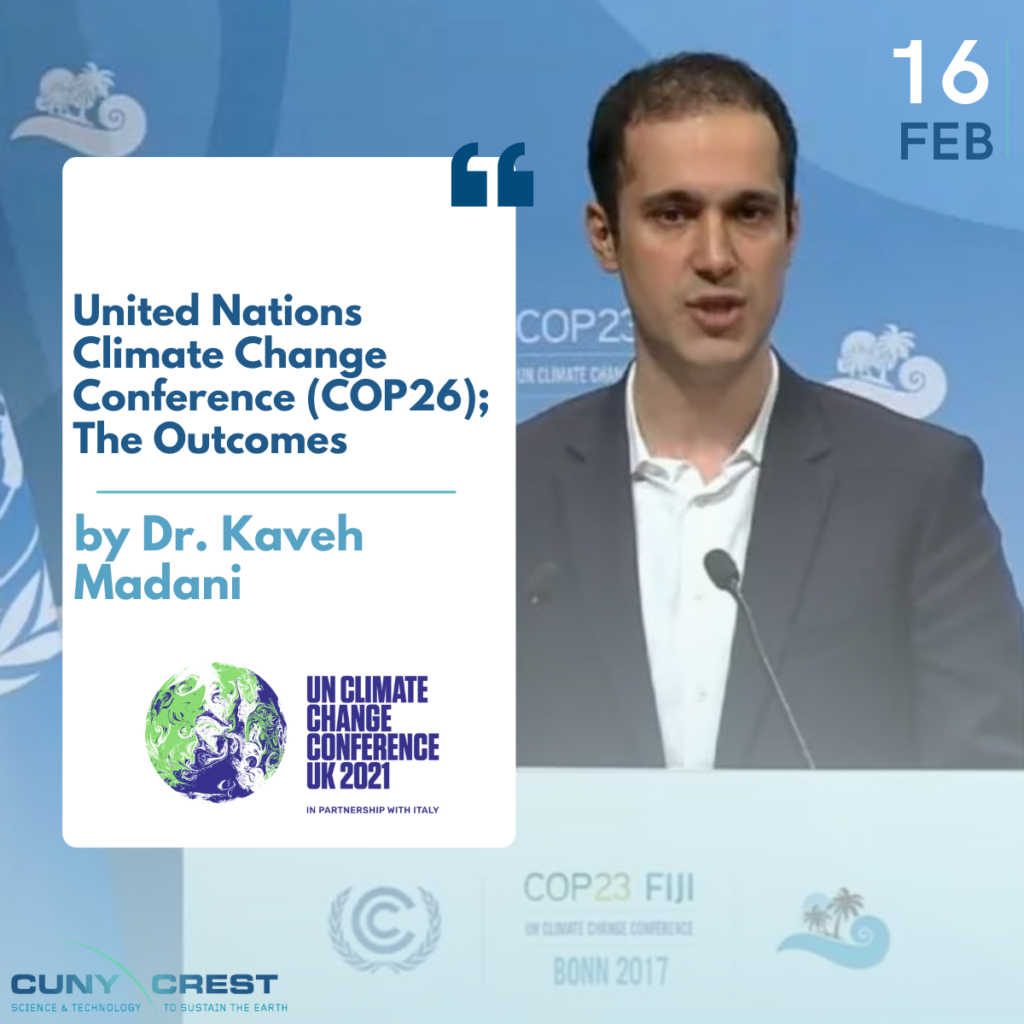United Nations Climate Change Conference (COP26); The Outcomes
United Nations Climate Change Conference (COP26); The Outcomes by Dr. Kaveh Madani
The 2021 United Nations Climate Change Conference (UN) commonly known as (COP26), was the 26th UN Climate Change conference, held in Glasgow, Scotland, United Kingdom (UK), from 31 October to 13 November. COP26 was delayed by a year due to the COVID-19 pandemic and is considered the most significant climate change summit since the 2015 COP21 in Paris, France where parties negotiated a landmark agreement to limit the global temperature increase in this century to 2 degrees Celsius while pursuing efforts to limit the increase even further to 1.5 degrees.
COP is a “Conference of the Parties”, an annual UN meeting where almost all countries around the world are invited to come to present their plans for cutting emissions. Ahead of COP26, 200 countries had been asked for their proposals to cut emissions by 2030. The goal has been to keep cutting emissions until they reach net zero by mid-century.
At COP26, countries revisited climate pledges made under the Paris Agreement and set the global agenda on how to battle climate change for the next decade. Although the agreements made at COP26 is not legally binding, the parties decided to meet in Egypt next year for COP27 where further cuts to carbon emissions will be pledged. According to the scientific consensus, the current emission cut pledges, even if met, are only enough to limit global warming to around 2.4 degrees Celsius, which will have catastrophic ramifications for the planet and its inhabitants.
One of the most significant agreements at COP26 was the provision of an explicit plan to reduce the use of coal, which is responsible for more than 40% of annual carbon emissions. There was hope that countries would reach an accord to “phase out” coal, but after strong objections from China and India, nations decided to change the wording to “phase down” coal. Another important decision from more than 100 countries that house about 85% of the world’s forests, was a promise to put an end to deforestation by 2030. In addition, a scheme to cut methane emissions by 30% by 2030 was put forward by more than 100 countries excluding Russia, India, and China, which despite being big emitters, stated that they hope to join the initiative later rather than commit to anything now.
On the financial front, the treaty declares to significantly increase money to help poor countries deal with the damages of climate change and make the transitions to clean and sustainable energy. There’s also the possibility of a trillion USD annual aid fund from 2025. This comes after a previous pledge for wealthier countries to provide 100 billion USD a year by 2020 did not materialise. World powers also agreed eventually to “phase out” subsidies that artificially lower the price of coal, oil, or natural gas.
Some say the COP26 agreement represented the start of a breakthrough with regards to the fight against climate change, but some African and Latin American countries felt that the progress made is not enough to address the urgency of the problem. Only a few countries have made their commitment legally binding with the rest carrying out their own self-policing with regards to the decisions made at Glasgow.




